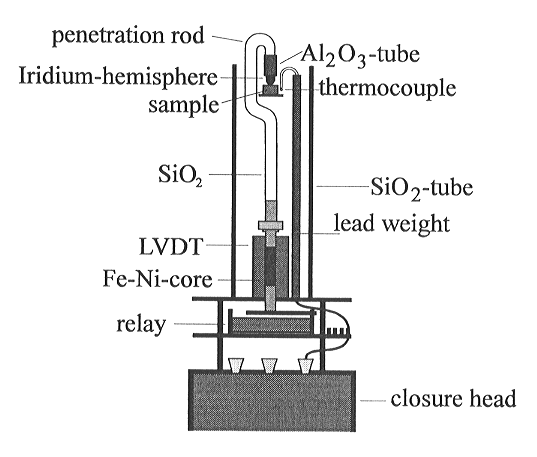

Viscosity is one of the most important properties of a melt. It is essential
for the quantitative modelling of geological processes in the Earth's interior
such as magma ascent and eruption. In particular the H2O content
can strongly influence the rheology. Measurements under room-pressure are
restricted to investigations of samples with small amounts of water. This
work presents a novel method to measure the viscosity of water-bearing
melts in the range
108 <  < 1011
Pa s under high pressure.
< 1011
Pa s under high pressure.
The apparatus has been developed to fit into a vertical furnace which is placed in an internally heated pressure vessel. This set-up is designed to be used at high temperature (to 1000°C), and high pressure, up to 10 kbar. It is built up on a high pressure closure head and is based on the micropenetration method. It consists mainly of a penetration-rod, a linear variable differential transformer (LVDT), a relay and a glass-tube which supports the sample as illustrated in Fig. 3.8-5.
 |
Fig. 3.8-5: The penetration viscosimeter. |
The principle of measurement is simple. After the apparatus is placed into the autoclave, a relay which raises the penetration rod about 1-2 mm above the sample is switched on. When the conditions of measurement are achieved the relay is switched off and the rod with an iridium-hemisphere on the top penetrates the surface of the sample. The penetration distance is measured by a LVDT. Three thermocouples inside the furnace are necessary to control the temperature and minimise the temperature gradient.
Distance, time and temperature are recorded by a computer, and the viscosity
 can be calculated according to
can be calculated according to
 = 1.875 F t / r0.5 S1.5
= 1.875 F t / r0.5 S1.5
In this equation is F the force on the rod which penetrates the sample, t the time, S the penetration distance and r the radius of the iridium-hemisphere.
This project is still in the preparation phase. Tests under atmosphere pressure are currently in progress to improve and calibrate this set-up for experiments under high pressure.

Tel: +49-(0) 921 55 3700 / 3766, Fax: +49-(0) 921 55 3769, E-mail: bayerisches.geoinstitut(at)uni-bayreuth.de
 Previous page
Previous page